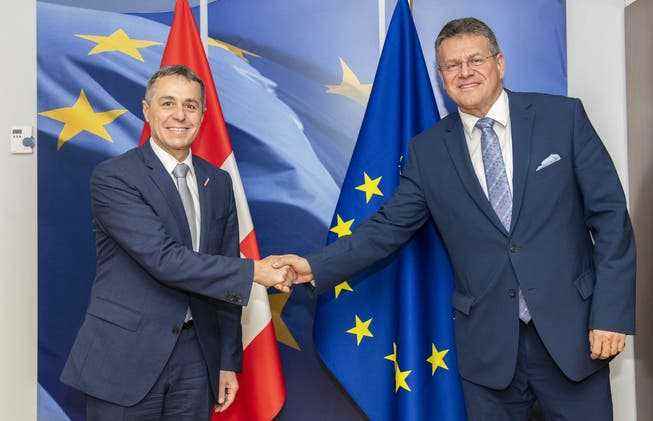What next in the bilateral crisis? The German parliamentarian Markus Töns held talks with those responsible on both sides. He speaks of mutual irritation, upset French – and a possible way out.
What will you propose to the Federal Council? Foreign Minister Ignazio Cassis and State Secretary Livia Leu, photographed in winter 2020.
Mr. Töns, the first trip of the EU Committee of the German Bundestag in this legislature takes you to Switzerland, which is not part of the EU. How is this to be understood?
As a sign of how important Switzerland is to us. In Germany we are very concerned about the broken relationship between the EU and Switzerland. There seems to be some kind of blame game going on behind the scenes at the moment, with each side trying to blame the other. That’s not a good sign. Economically, but also politically, Germany has a great interest in a solution finally being found here.
You don’t sound very confident.
Well, we’ve been in contact with both sides over the last few weeks and days. And I have to say, it’s really not looking good. Maros Sefcovic, the responsible Vice President of the EU Commission, recently visited us in Berlin. He is intensively looking for solutions, but the attitude of the Swiss government is difficult to assess. Here we are trying to help clear the thick fog that has gathered between Brussels and Bern.
You met Swiss negotiators in Bern. What message did you take away from here?
There wasn’t a lot of confidence here either. Apparently there are mutual irritations about the negotiation style. For example, both sides say they wanted to arrange a meeting, but the other side didn’t have time. It seems to me that people talk too much about each other and not enough with each other.
The Federal Council is currently discussing how to proceed. Based on your talks, where do you see a possible solution?

My concern is that the negotiations will fail again if the same issues are immediately discussed for which no solution has been found in recent years. Don’t get me wrong: I’m convinced that solutions are possible. With a bit of good will, the Swiss trade unions, for example, would have to acknowledge that wage protection is also possible with EU rules. We can see that in the example of Germany. Unfortunately, I doubt that there is sufficient willingness to make such insights at the moment. For this reason I consider the plan of the Swiss Social Democrats as a possible way out.
You mentioned the proposal for a temporary “stabilization agreement”: the EU should include Switzerland in cooperation again, especially in research; In return, Switzerland should increase the cohesion contribution and make it clear that it intends to settle the institutional disputes by 2027. Is this realistic?
In any case, more realistic than other proposals that have already been discussed. A solution is needed, and Commissioner Sefcovic is also aware of that. In my view, the proposal represents an approach that would make the Commission ready to discuss a transitional solution.

“It seems to me that people talk too much about each other and not enough with each other”: The last meeting between Federal Councilor Ignazio Cassis and Maros Sefcovic, Vice President of the EU Commission, took place in November 2021 in Brussels.
Indeed? So far, the EU has not wanted to make any concessions to Switzerland as long as the institutional issues have not been clarified. And in this respect, the EU would have nothing in its hands except for vague announcements.
I do not think so. Because the agreement would be clearly limited in time, Switzerland would certainly be under a certain amount of pressure to act. It would be a credible commitment to negotiate a solution within a reasonable period of time. Otherwise, Switzerland would have to reckon with dropping out of all programs again in 2027. I could imagine that such an interim solution would give both sides the time and peace they need to find a permanent solution. Nobody believes that an agreement will be reached in the short term, if only for procedural reasons.
What do you mean?
There are concerns in Brussels that the new negotiating approach proposed by Switzerland alone would require the definition of a new negotiating mandate. This entails an enormous effort and would take a lot of time. Many bodies would be involved, and national parliaments would also want to have a say. I doubt whether France, for example, would currently lend a hand for a solution in favor of Switzerland.
Do you think Paris still has a cold because Switzerland didn’t want to buy the French fighter jets?
The reasons are not clear to me. In our conversations, we simply notice that people in France don’t speak very well to Switzerland.
They come from Gelsenkirchen, North Rhine-Westphalia. How do the people in your home country view Switzerland, this country that lies in the middle of Europe and yet is a little off the beaten track?
Above all, no one believes me when I say that the EU is currently having serious difficulties with Switzerland. People seem to have a hard time imagining that you can have real problems with the Swiss. I don’t see that the Swiss are resented for being offside.
Well informed observer
fab The German SPD politician Markus Töns is not himself involved in the talks between Switzerland and the EU, but knows the views of both sides. He led a delegation from the German Bundestag’s EU committee that visited Switzerland last week. The main topic of the trip: the “reorganization of relations” between the EU and Switzerland. In Bern, the delegation spoke to Federal Councilor Simonetta Sommaruga and the Deputy State Secretary in the Department of Foreign Affairs, Patric Franzen, among others.
